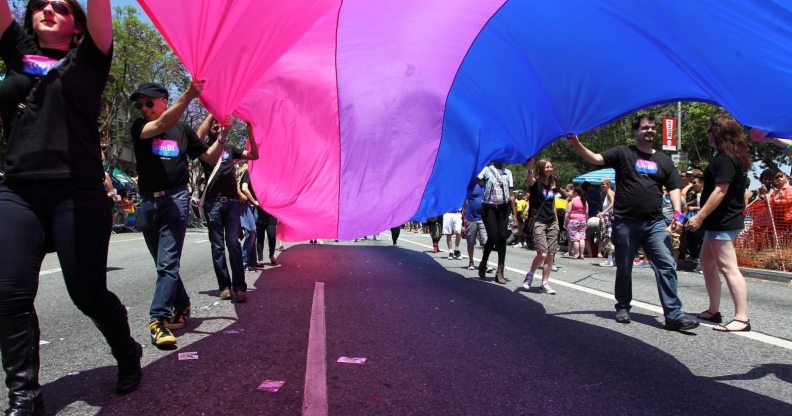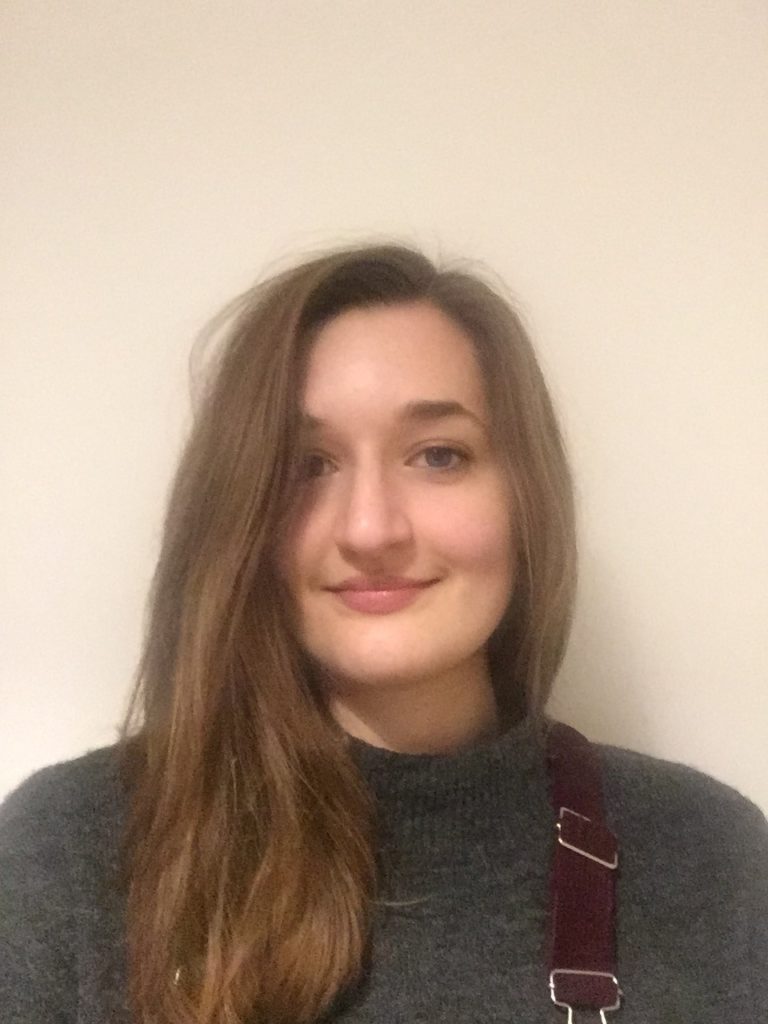Do we need Bi Visibility Day? Yes, of course we do!

The bisexual pride flag at Los Angeles Pride 2009. (David McNew/Getty Images)
On the 20th Bi Visibility Day, and after the first Bi Pride, Laura Russell, director of campaigns, policy and research at Stonewall reflects on why we still need Bi Visibility Day.
It’s the 20th Bi Visibility Day, and sometimes it feels like we’re making great progress.
We’re getting to a stage where there are a few more visible, unapologetic role models.
Last year we had a whole TV show called The Bisexual, and people like Aubrey Plaza and Halsey are helping to increase visibility of bi women.
But you don’t need to scratch too far beneath the surface to find the wave of comments about how they’re all just trying to titillate their fans with performative queerness, when in fact they are just “boring and straight”.
I would have thought we’d come a bit further than that by now, but sadly it’s still too frequent that I’m reminded of people’s distrust at the word bi, from both within and outside of the LGBT+ community.
People just think it’s a lie, something constructed to make you seem more interesting or refuse to believe it’s part of your identity.
If you’re a woman, the assumption is that you’re just “acting gay” for men’s entertainment. Perhaps you’re a tourist, on a lovely adventure before you inevitably decide to settle down, marry a man and have twins.
If you’re a man, people assume that you are gay, but that you want to hide it. Funny how everyone assumes we’re all into men, isn’t it?
And that’s before we get on to stereotypes: we’re greedy, slutty, indecisive. Basically, a bit of a mess.
It’s a shame I still have to spell this out, but here it is: bi people exist and we’re not a collection of shallow stereotypes. But every time someone makes an assumption like this, it makes it harder to be open about who you are.
Personally, I haven’t been particularly visible in the past. That’s for a mixture of reasons and being openly bi is a personal decision for everyone. But for me, largely it has been because of the expectation that I will get told that I’m attempting to be more interesting than I am, or that I’m actually a lesbian in hiding.

Laura Russell, director of campaigns, policy and research at Stonewall. (Supplied)
After briefly coming out at school, I quickly tried to make a u-turn when I experienced bi and homophobic bullying (and a new nickname, which I won’t repeat in case it catches on again).
Thankfully, at university, I met a bunch of truly excellent queer women who helped me feel much more confident in who I was.
But until I moved to Stonewall, I was never very open about who I was in the workplace, especially in environments in some of my very first jobs where there was already a lot of sexism. And that’s not uncommon, nearly two in five bi people (38 percent) aren’t out to anyone at work.
All of this has a massive impact on bi people’s lives. We’re way less likely to be out to our friends, family and colleagues. Stonewall’s research found that a third of bi people (32 percent) say they cannot be open about their sexual orientation with anyone in their family, and more than one in four bi women (27 percent) and almost one in five bi men (18 per cent) have experienced discrimination from others within the LGBT community.
And dating can be a bit of a minefield. Initially I put the fact that I’m bi on profiles – but that ended up a series of disasters, irrespective of who it was I was meeting up with. All of this can make you feel like you have to present your whole dating history to justify that you’re queer enough or hide facts about your life – and neither of those options leaves you feeling great.
When you can’t be open about who you are to your family, or within the LGBT community, being bi can feel lonely.
We face biphobia without having support from the people who are closest to us, and 50 percent of bi men and 43 percent of bi women say they’ve never attended LGBT-specific venues and events in their local community.
Overall, bi people have higher levels of anxiety than lesbian, gay and straight people – 72 percent of bi women reported experiencing anxiety, and 56 percent of bi men. And this will be worse for those with other intersecting identities, for example bi people of colour, bi trans people, bi disabled people and bi people of faith.
So if you’re still asking whether we need Bi Visibility Day – yes of course we do. It’s a chance to celebrate and ask lesbian, gay and straight people to recognise us for who we are.
If you want to be an ally, be supportive! There’s a role for everyone in challenging biphobia, harmful stereotypes and addressing bi-erasure when you come up against it.
So, today, join me in celebrating Bi Visibility Day, and support the amazing bi community.

